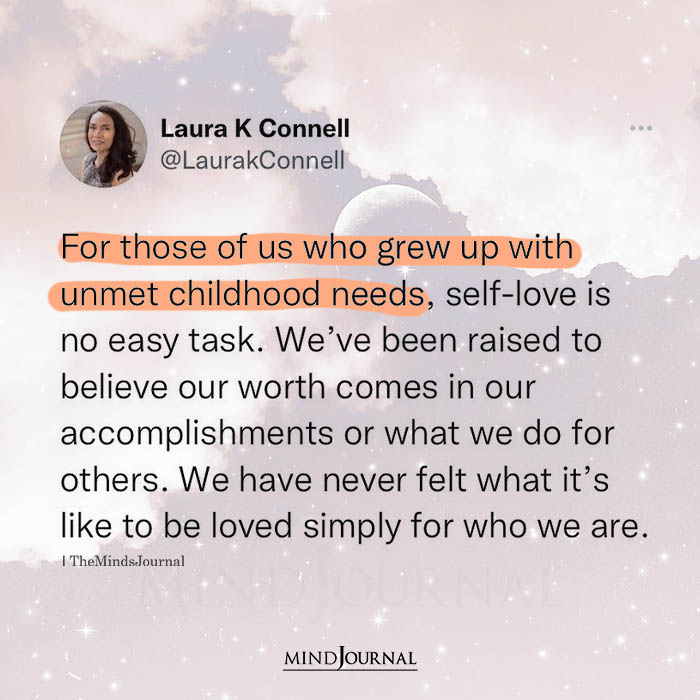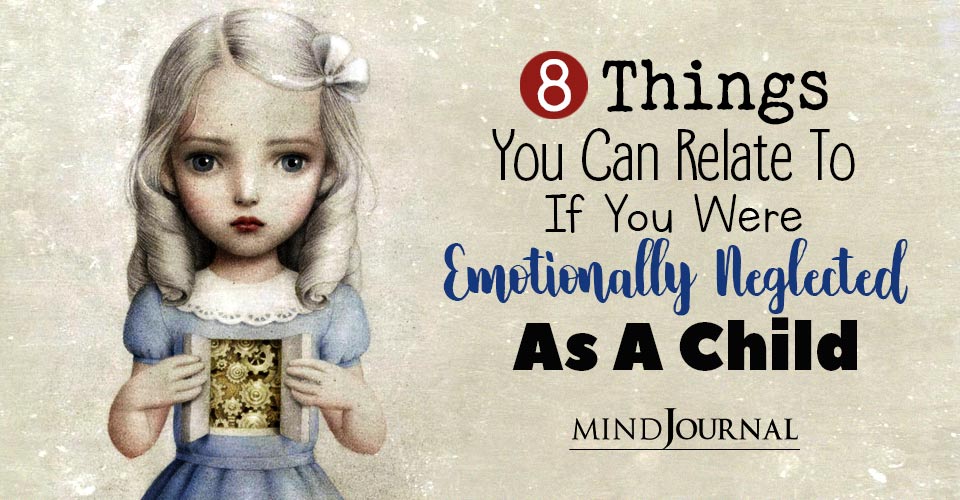A feeling of emptiness will be your lifelong companion if you were emotionally neglected as a child. Going through emotional neglect as a child can leave you with many emotional scars and massive childhood trauma.
Most of us had a great time while we were children. Childhood meant being happy for no reason and living life without any worries. But not all of us are that privileged.
Yes. A happy childhood is also a privilege and not all of us enjoy the privilege. Only the lucky ones are able to enjoy their childhood.
For some of us, our childhood is a synonym for pain and loneliness and sadness and bad parents and whatnot. Some people go through so much in their childhood that the experiences of childhood begin to affect our adulthood as well. This is because as children if you have had a bad experience, it will stay with you throughout your life.
Related: The Lifelong Effects of Childhood Neglect By Parents
8 Things You Can Relate To If You Were Emotionally Neglected As A Child
1) Is trusting yourself difficult for you?
This is one of the major signs you were emotionally neglected as a child. If you were an emotionally neglected child, you will find it very hard to trust yourself. You always assume that the worst things will happen to you and you will not be able to achieve anything in your life.
This is because the people around you made you feel that you aren’t made for big things or for that matter anything. Don’t do this. How much ever hard it may be, trust yourself and you will see yourself succeeding in life.
2) Do you feel empty?
The thing about being emotionally neglected as a child is that painful feeling of emptiness that always makes you feel like it’s going to swallow you whole. You feel alone and miserable all the time, and no matter how hard you try, you just can’t shake off the feeling.
In this process, you let go of people who might actually care for you. This ends up in you feeling a gnawing emptiness.
Sometimes you feel that you will never be able to overcome this emptiness. Don’t feel so. Don’t break your heart. You will be whole again.

3) Do you love that you are independent?
Emotional neglect forced you to become mature too soon. This means that you took up the responsibilities on your own even as you were a child.
And it is so bad to mature soon because this means you lost your childhood too soon. But the fact is that you are proud of your own independence and you won’t give it up for anything else.
Well, you should be. Not everyone is as independent as you.
Related: 10 Things Toxic Parents Say And What They Actually Mean
4) Do you love your alone time?
The thing is that you might be in a group or you might be surrounded by people who like you but there is nothing in the world that is more valuable to you than your alone time.
The reason for this is that your alone time helps you rejuvenate. This means that you need to be alone in order to heal and become better and hence you love your alone time. There is so much that you have to heal from.
5) Do you have mood swings?
One of the major emotionally neglected child signs is mood swings. As a person who has been through emotional neglect, I can tell you one thing for sure and that is that sometimes you don’t know why you are sad.
Then there are times when you are suddenly happy and you don’t know why. There is so much movement in your emotions from happy to sad that even you yourself are unable to understand your mood swings.
Surely, it is super hard to deal with mood swings because only a few people around you will understand them. Others shall only judge.
6) Do you criticize yourself too much?
If you were emotionally neglected as a child, then you are very critical of your own self. This is very common for people who have been through emotional neglect and childhood trauma.
You will constantly feel the need to be perfect and you won’t even know why. Sometimes you may criticize yourself so much that you might lose all faith in yourself and even your sense of purpose.
Don’t do this to yourself! Trust the fact that you are good enough and you are fine. People in your life have been bad and this is why they made you feel like you are bad. Don’t feel that!
Related: Effects of Growing Up as an Unloved Child and How To Heal
7) Do you love nature or animals more than people?
A person who has been through emotional neglect may end up living a life where they don’t really associate with the people around them. This is perfectly normal. Don’t worry.
You will be able to relate to the natural world so much more. You will be able to appreciate nature at a level at which other people cannot even begin to think.
You might even find solace in hanging out with animals. It is actually therapeutic for you to be in nature or be with animals. And this is perfectly okay.

8) Do you feel like you don’t belong?
If you were emotionally neglected as a child, you will feel like an outsider forever in your life. This means that sometimes you won’t feel like you belong to anyone or to any place.
You might feel that no one understands you or no one pays attention to you or no one cares enough for you. This may happen frequently in your life. Don’t worry. Someday, you will heal and you will finally feel like you belong. Someday, you will make it!
I want to say one thing in the end. Maybe you have been through a lot as a child but don’t let that experience of your childhood affect your adult life.
Don’t. It is not worth it. Take control of your life and your emotions and spread the love. Maybe you didn’t get it but give it and you will feel so happy!
Related: 4 Ways That Childhood Trauma Impacts Adults
Even if you have been emotionally neglected as a child, try your best to fill your life with things you love. Fill the blank portions of your life’s canvas with colors that no one can erase.
Love yourself!
Want to know more about being emotionally neglected as a child? Check this video out below!
References: Jonice Webb.com, Running On Empty and Running On Empty No More.
The Minds Journal Articles Volume -1 is Copyright Protected vide Regd.# L-103222/2021















Leave a Reply